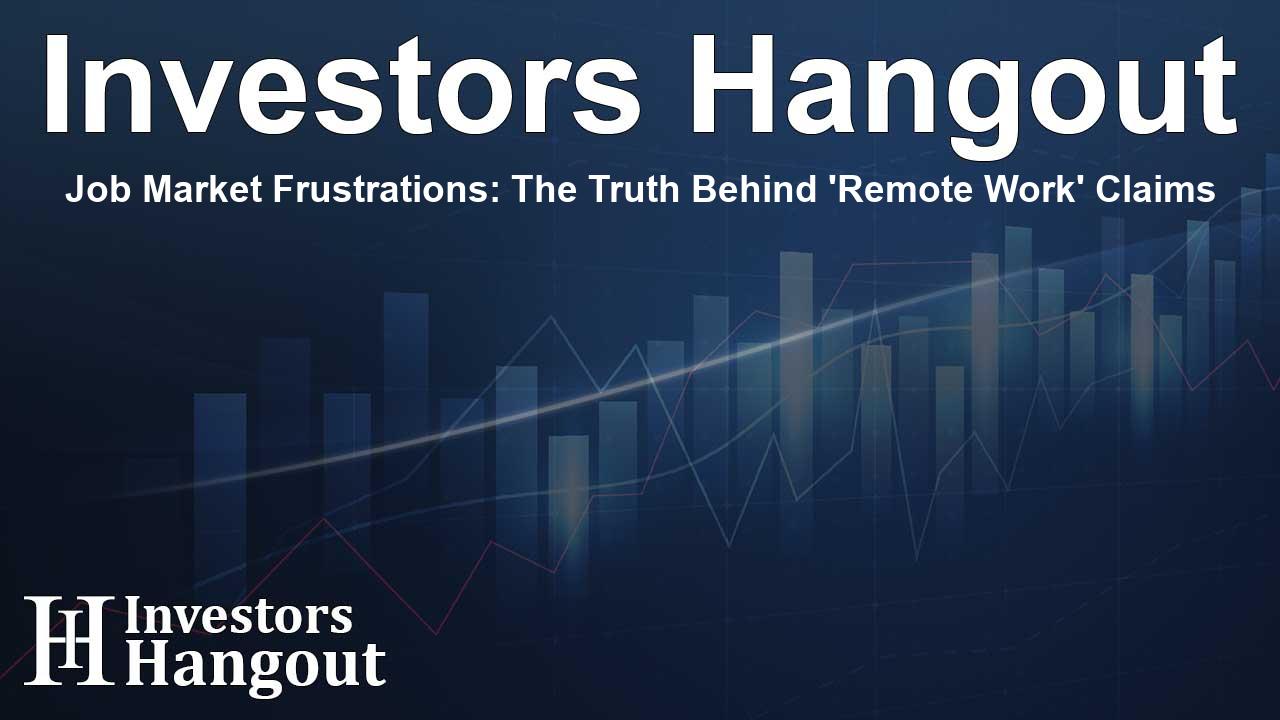Job Market Frustrations: The Truth Behind 'Remote Work' Claims

Job Seekers Faces Misleading Remote Work Claims
Recently, stories shared online illustrate a frustrating trend in the job market, particularly concerning remote work commitments. Job seekers are collectively expressing outrage over interviews that promise flexible arrangements only to reveal hidden requirements for in-office presence. This alarming shift has spurred discussions surrounding the ethics and practices of recruitment in the modern workforce.
The Disheartening Interview Experience
Initial Contact with the Recruiter
One user recounted their experience of being approached by a recruiter for a "mostly remote" position at a SaaS company. The candidate was informed they would only need to come into the office a couple of days each month—terms they found acceptable. This seemed promising, and enthusiasm grew as they progressed through the application process.
A Grueling Process
The experience soon turned into an exhausting series of six interviews alongside a demanding five-hour project. Despite initial hesitations about the significant time commitment, a VP of the department made a personal call assuring the candidate of their value, declaring them a top contender for the role.
A Shocking Twist
To their disbelief, during a call expected to finalize their employment, the hiring manager revealed the job now required full-time office attendance. The candidate had previously communicated their unwillingness to relocate, as the role had been presented as remote initially. The ambiguity and sudden change left them astounded.
Reactions to the Change
Following this disheartening news, the recruiter later contacted them again, stating the company necessitated someone in the office four days a week. This abrupt pivot left the candidate feeling deceived and frustrated. "This job market has become a joke," they remarked, expressing disappointment in the treatment they received.
Industry Responses and Community Support
Insight from Commenters
The post resonated with many online, igniting a dialogue about the ethical dilemmas in hiring practices. One commenter expressed disgust at how companies exploit current job conditions to gain free labor insights from seasoned professionals. Others echoed similar sentiments, suggesting the applicant was unfairly used to complete projects without recompense.
Learn From Others' Experiences
Several offered advice, confirming the importance of being cautious when asked to provide extensive work during an application process without compensation. Additionally, discussions highlighted crucial warning signs that should have been recognized earlier, such as multiple interview rounds and excessive project demands.
Wider Implications for Job Seekers
Recognizing the Bigger Picture
This specific incident transcends individual frustration, reflecting a broader issue in the job market. Comments spanned experiences from candidates over the years communicating a sense that employers falsely advertised positions under the guise of flexibility, only to be met with rigid in-office mandates.
Call for Changes in Hiring Practices
Many voices joined together, emphasizing the need for greater transparency in job postings to avoid misleading candidates. This movement seeks to reshape hiring protocols that have veered away from promising job seekers remote work only to shift responsibilities back to office settings.
Understanding Today's Job Market Dynamics
The Realities of Hiring Today
The frustrations expressed by job seekers reveal a fundamental shift in the employer-candidate relationship. Firms are faced with the challenges of maintaining productivity while navigating the realities of hybrid work. Still, the need for honesty and respect during hiring processes must remain paramount.
Future Outlook for Remote Work
As companies adjust to changing labor dynamics, there is genuine concern among professionals regarding the stability and reliability of remote positions. There is a risk that flexible work arrangements could dissipate, leading candidates to remain cautious with offers that seem too good to be true.
Frequently Asked Questions
What is the main issue raised in the article?
The article addresses the growing frustration among job seekers regarding misleading claims about remote work and the often hidden demands for in-office attendance.
How did the Reddit user's experience unfold?
The user participated in a lengthy interview process, only to discover that the position required regular in-office presence, which contradicted initial representations.
What advice is offered to job seekers?
Job seekers are advised to be cautious of companies that require extensive projects without compensation and to watch for red flags during the interview process.
What impact does this issue have on job seekers?
This phenomenon creates significant frustration and wasted time for job seekers, who may find themselves misled by hiring practices that lack transparency.
What are the broader implications for the job market?
There is a growing sentiment that companies must return to honest advertisement practices to foster a healthier work environment and restore trust between employers and candidates.
About The Author
Contact Evelyn Baker privately here. Or send an email with ATTN: Evelyn Baker as the subject to contact@investorshangout.com.
About Investors Hangout
Investors Hangout is a leading online stock forum for financial discussion and learning, offering a wide range of free tools and resources. It draws in traders of all levels, who exchange market knowledge, investigate trading tactics, and keep an eye on industry developments in real time. Featuring financial articles, stock message boards, quotes, charts, company profiles, and live news updates. Through cooperative learning and a wealth of informational resources, it helps users from novices creating their first portfolios to experts honing their techniques. Join Investors Hangout today: https://investorshangout.com/
The content of this article is based on factual, publicly available information and does not represent legal, financial, or investment advice. Investors Hangout does not offer financial advice, and the author is not a licensed financial advisor. Consult a qualified advisor before making any financial or investment decisions based on this article. This article should not be considered advice to purchase, sell, or hold any securities or other investments. If any of the material provided here is inaccurate, please contact us for corrections.
